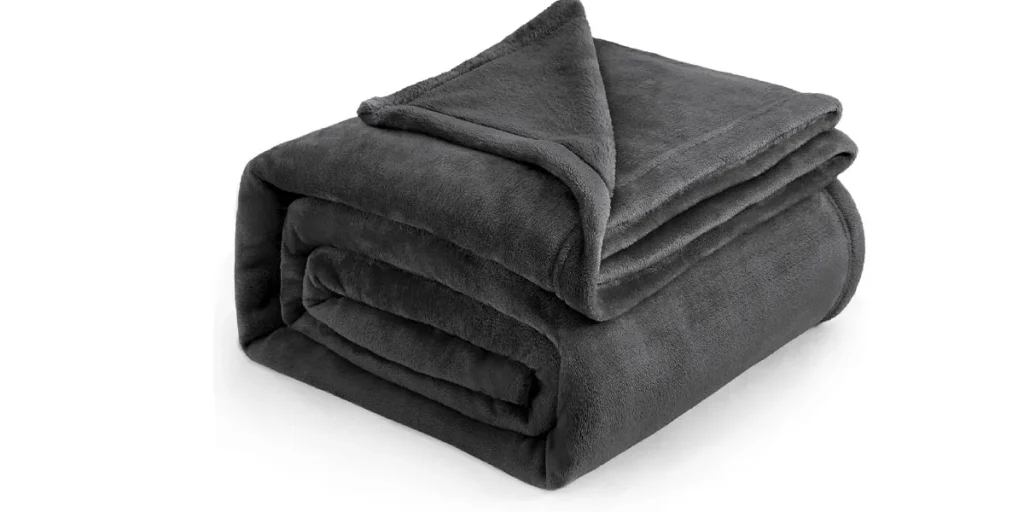A blanket’s weight varies, typically ranging from 1 to 8 pounds (0.45 to 3.6 kg). The size, material, and weave all influence the final weight of a blanket.
Understanding the weight of blankets is essential for comfort and utility purposes. Lightweight blankets such as cotton throws might weigh as little as 1 to 2 pounds, ideal for summer nights.
In contrast, heavier options like thick wool blankets or weighted blankets can easily tip the scales at 4 to 8 pounds, suitable for winter or therapeutic uses.
The choice of a blanket’s weight significantly impacts its warmth and the quality of sleep it can promote, making it a crucial consideration for buyers seeking the perfect bedding to suit their needs.
Picking the right weight contributes to overall sleep hygiene and can enhance the sleeper’s relaxation and sleep quality.
Importance Of Knowing Your Blanket’s Weight
Knowing the weight of your blanket is more crucial than most think. It impacts how well you sleep and even your health. Blanket weight can change how cozy your bed feels.
Comfort And Sleep Quality
A perfect blanket weight means better sleep. Too heavy, and you might feel trapped. Too light, and you might not feel secure enough.
The right weight keeps your sleep deep and uninterrupted. Weight stimulates gentle pressure to your body, known as Deep Touch Pressure (DTP). DTP enhances the release of serotonin, a sleep-promoting hormone.
Seasonal Variations And Their Effects
Blankets are not one-size-fits-all for every season. You need different weights for different times of the year. In summer, a lighter blanket avoids overheating.
During winter, a heavier blanket keeps you warm. The weight also helps with climate control in your bed.
The table below shows suggested blanket weights for seasons:
| Season | Weight Range |
|---|---|
| Summer | 1-4 lbs |
| Spring/Autumn | 4-10 lbs |
| Winter | 10-20 lbs |
Remember, personal preference always plays a role. Choose a blanket that makes your sleep feel just right.
Different Types Of Blankets And Their Weights

Wrapped in warmth, every blanket has a unique feel and weight. Understanding the weight variations helps in choosing the right comfort.
Lightweight Comfort
Fleece blankets offer a wonderful mixture of coziness and lightness. These snuggly throws generally weigh between 1 to 3 pounds. Perfect for chilly evenings without the bulk.
- Standard throw size: about 1 to 2 pounds
- Twin size: around 2 to 3 pounds
- King size fleece: can reach up to 4 pounds
Down Duvets: The Luxury Of Warmth
Down duvets fill bedrooms with elegance and warmth. Filled with feathers, these plush covers range from 5 to 8 pounds. They are warm yet surprisingly light.
| Size | Weight |
|---|---|
| Twin | 5-6 pounds |
| Queen | 6-7 pounds |
| King | 7-8 pounds |
Weighted Blankets: The Heavy Comforters
Weighted blankets are the superheroes of snug sleep. Designed to be heavy, they typically start at 10 pounds and can go up to even 30 pounds. They apply gentle pressure for a calming effect.
- 10 pounds: suitable for kids
- 15-20 pounds: ideal for average adult users
- 25-30 pounds: for adults preferring extra weight
Measuring The Weight Of Your Blanket

Curious about your blanket’s weight? Knowing this can be essential, especially when considering mailing costs or confirming the warmth level of a weighted blanket. Let’s dive into measuring what you cozy up with.
Tools And Techniques For Accurate Measurement
Finding the weight of your blanket is not a tough task. Use these tips:
- Start with a reliable digital scale.
- Place the scale on a flat, hard surface.
- Ensure the scale is zeroed out before measuring.
- Lay the blanket evenly on the scale.
- Record the weight displayed. Use grams or pounds depending on your need.
Common Pitfalls In Estimating Blanket Weight
Watch out for these issues:
- Using a broken or uncalibrated scale can skew results.
- Uneven surfaces lead to incorrect measurement.
- Don’t guess. Estimates can be far from the actual weight.
- Moisture can add extra weight. Measure when the blanket is dry.
Factors That Contribute To Blanket Weight
Ever wonder why some blankets feel like a light hug while others weigh down like a gentle anchor?
The weight of a blanket isn’t just a number; it can affect comfort, warmth, and sleep quality.
Let’s explore what factors contribute to a blanket’s weight, helping you choose the ideal cozy companion for your snooze.
Material Matters: Fabrics That Factor In
The fabric type is a key player in a blanket’s weight. Different materials have different densities and fiber structures, influencing the heft. Here’s a quick rundown:
- Cotton – Light, breathable, and perfect for summer nights or warmer climates.
- Wool – Warmer and heavier, ideal for cold weather but varies depending on the sheep breed.
- Fleece – Synthetic warmth that comes in different thicknesses and weights for tailored comfort.
- Down – Feathery light yet an excellent insulator, keeping you toasty with minimal weight.
- Synthetic fibers – Often mimic natural materials and range widely in weight.
Size And Thickness: How They Tally Up
The dimensions and puffiness of your blanket directly impact its weight. Larger blankets require more material, which adds weight.
Similarly, thicker blankets with more filling or a denser weave also tip the scales a bit more. See the chart below to understand the typical weight ranges:
| Blanket Type | Size | Typical Weight |
|---|---|---|
| Throw Blanket | 50″x60″ | 1-4 lbs |
| Twin Blanket | 66″x90″ | 2-6 lbs |
| Queen Blanket | 90″x90″ | 4-8 lbs |
| King Blanket | 108″x90″ | 5-20 lbs |
Remember, the thickness and knit or weave pattern can also influence the overall weight, so two blankets of the same size might feel different due to their build and material choice.
Choosing The Right Blanket Weight For You
When you curl up in bed, the right blanket can make all the difference. A blanket too heavy might be stifling, while one too light may not be cozy enough.
Finding the perfect blanket weight contributes to a comfortable night’s sleep. Let’s explore how to select the one that’s just right for you.
Personal Preferences And Sleep Habits
Consider your sleep style and comfort level when picking a blanket.
- Are you a hot sleeper or do you often wake up cold?
- Do you like the feeling of pressure on your body as you sleep?
A light cotton blanket could be perfect for those who get warm at night. A heavier wool blanket suits those who feel cold. Some prefer the embrace of a weighted blanket to feel secure and calm.
Health Considerations In Selecting Blanket Weight
Health is key when choosing a blanket’s heft.
| Condition | Recommended Blanket Weight |
|---|---|
| Insomnia or Anxiety | Weighted Blanket (5-10% of body weight) |
| Circulation Issues | Lighter Blanket |
| Respiratory Conditions | Medium Weight Blanket |
A weighted blanket might help those with insomnia. It may also provide comfort for those with anxiety. However, it is not advisable for children under a certain age or weight.
For those with circulatory problems, a lighter blanket that does not constrict blood flow is best.
If you have a respiratory condition, avoid very heavy blankets. They can make breathing more difficult.
Maintenance And Care For Different Weights Of Blankets
Blankets offer comfort and warmth in various weights and fabrics. Proper care extends their life, ensuring they remain as cozy as the first use.
Different weights require specific maintenance routines. Light throws need delicate handling unlike heavy weighted blankets.
Cleaning Techniques By Blanket Type
Each blanket type has unique cleaning needs. Follow these simple steps to keep them fresh:
- Fleece and cotton: Machine wash with cold water. Use gentle cycle.
- Wool: Hand wash or select wool cycle on washing machine. Use mild detergent.
- Weighted blankets: Check if the inner blanket is machine washable. Wash cover separately.
For stains, spot clean immediately to prevent setting. Air-dry lightweight blankets. Use low heat for thicker ones.
Storage Solutions For Optimal Longevity
Storing blankets properly keeps them in prime condition. Use these tips:
| Blanket Weight | Storage Tip |
|---|---|
| Light | Fold and place in a dry closet. Use breathable cotton bags. |
| Medium | Roll to avoid creases. Store on a shelf or in under-bed storage bins. |
| Heavy | Fold and store in a plastic bin. Use silica gel packets to deter moisture. |
Keep out of direct sunlight. Mothballs or cedar blocks prevent pests in wool blankets. Ensure areas are clean and dry.
FAQs About the Weight of a Blanket
What Factors Affect A Blanket’s Weight?
Blanket weight varies based on material, size, and thickness. Materials like cotton, wool, or fleece can be lighter or heavier.
Larger and thicker blankets will naturally weigh more.
How Heavy Is A Typical Fleece Blanket?
A typical fleece blanket weighs around 1 to 2 pounds. However, sizes and material density can cause this weight to vary.
Lightweight options are ideal for summer, whereas heavier ones are better for winter.
What Is The Weight Range For Comforters?
Comforter weights can range from 3 to 15 pounds. Lighter comforters are suitable for warm climates, while heavier ones are designed for cold weather. The filling material heavily influences the total weight.
Can Blanket Weight Affect Sleep Quality?
Yes, blanket weight can affect sleep quality. Heavy blankets can offer a sense of security and improve sleep for some.
Lighter blankets might be preferred by others for comfort and to avoid overheating.
Conclusion
Determining the weight of a blanket involves several factors. From lightweight summer throws to heavy winter comforters, options vary.
Remember, the right choice balances warmth and comfort. Check labels and specifications to find your perfect match. Sweet dreams await with your ideal blanket weight.
Resources:
https://www.cpsc.gov/FAQ/Baby-Blankets
